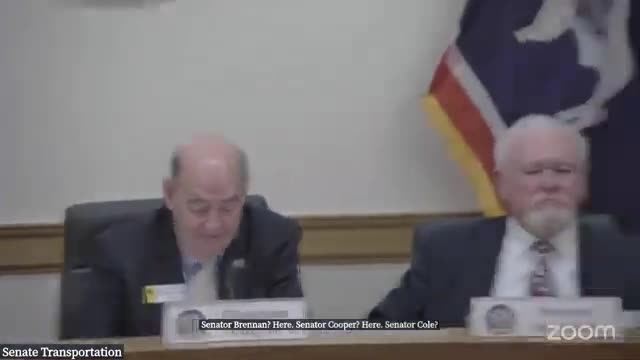Senate committee advances bill to create statewide electronic vehicle title and lien system
Get AI-powered insights, summaries, and transcripts
Subscribe
Summary
The Senate Transportation Committee voted to advance Senate File 25, which would create a statewide electronic lien and titling (e‑titling) system. Supporters say the system will reduce fraud and paperwork; counties and vendors raised questions about transaction fees and implementation timing.
CHEYENNE — The Senate Transportation Committee on Tuesday voted 5‑0 to advance Senate File 25, a bill directing the Wyoming Department of Transportation to implement a statewide electronic lien and titling system for motor vehicle titles, lien filings and related transactions.
The bill outlines a vendor‑operated e‑titling platform through which titles would be held electronically, liens could be filed and released, and applications and supporting documents could be uploaded. The bill sets an implementation deadline of July 1, 2027, and allows consumers to request paper titles if they prefer.
Why it matters: Supporters told the committee the change would reduce paperwork, lower storage and postage costs for lenders and credit unions, and help prevent title fraud by improving lien visibility across jurisdictions. Opponents and some county clerks urged careful rulemaking to ensure vendor interoperability with county systems and clarity on who will pay transaction fees.
Wyoming Department of Transportation program manager Lacey Bruckner told the committee the bill would allow “titles to be issued through that system, liens recorded through that system, and the data held through that system and transferred accordingly,” and that the department would administer the repository of statewide title data. She described the system as intended to let consumers choose between an electronic title and a paper title and to allow all supplemental documents — including VIN inspections and bonded‑title affidavits — to be uploaded and stored together.
Financial institutions and dealers backed the measure. Jeremy Gibson, chief executive officer of Torrington Valley Community Federal Credit Union, said two recent retail cases where lien information did not appear in the national database led to about $75,000 in losses for his institution. Dave Krause, chief executive officer of UniWyo Credit Union, said his credit union currently stores about 12,000 paper titles at an out‑of‑state facility, costing roughly $30,000 in 2023 and more than $42,000 in 2024; he said e‑titling could yield significant savings.
County clerks said they participated in an interim working group and generally support the concept, but warned the RFP and vendor selection must ensure interoperability with each county’s current title and registration databases. Fremont County Clerk Julie Friesen noted clerks will still have to review multiple supporting documents and meet statutory timelines for filings; she urged that the vendor system include automated checks against the national NMVTIS database and consistent MSRP lookups to reduce manual entry.
Fees and funding: Bruckner said working‑group vendors provided preliminary transaction‑fee estimates — which she described as “just estimates” that would be finalized through an RFP. The range of sample fees discussed included a lien filing fee of roughly $2.15, lien release around $1.10, title application about $10.35, title transfer roughly $25.50, salvage/junk title around $2.50, paper title print fees roughly $10–$20, and various registration and permit fees in single‑digit to mid‑tens ranges. She said the working group’s preference was that the system be “solely funded through transaction fees” rather than by a state or county appropriation.
Several committee members asked how vendors would be paid without charging counties or the state directly. Bruckner said the platform would collect transaction fees at the time of each transaction and remit the vendor’s portion according to the contract; county clerks would collect fees at their counters if they entered paper transactions into the system.
Implementation and risks: The bill requires YDOT to promulgate rules and permits contracting with one or more vendors. Bruckner and other witnesses acknowledged transition risks: interfaces with county systems must be developed, and jurisdictions that have partial e‑titling can pose transfer challenges. Committee members asked about continuity if a dealer or lender goes out of business and how older, paper‑only titles would be handled; Bruckner said existing titles would remain the same but the e‑titling system would interface with current state and county records so a buyer could verify the last owner of record without re‑entering historic titles into the new system.
Committee action: The committee unanimously voted to advance the bill. Chairman Stephan Pappas asked Senator Anderson to carry the measure to the Senate floor.
What’s next: If the bill passes, YDOT will issue an RFP and enter rulemaking. The bill sets an implementation date of July 1, 2027; stakeholders urged periodic committee updates on vendor selection, final transaction‑fee schedules and testing prior to full deployment.
